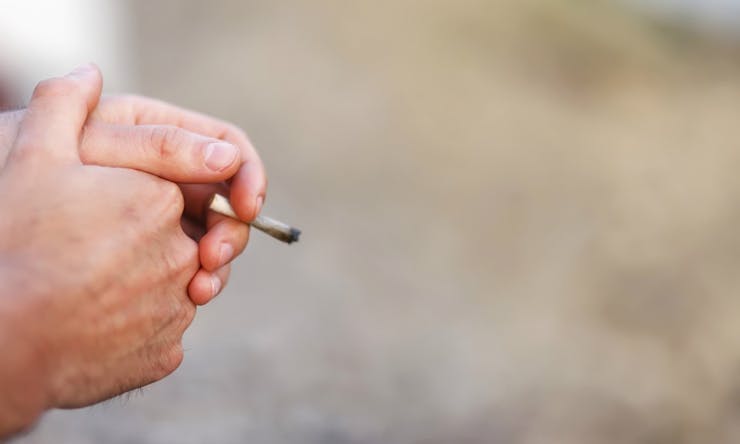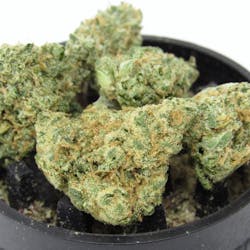In Washington, Oregon, Colorado, Alaska, and Nevada, it is completely legal to purchase and possess cannabis, which is amazing. But if you want to find a legal place to actually smoke some of your haul, things shift from amazing to confusing in a hurry. None of the four states that have legalized cannabis currently allow for public consumption, be it in the form of a cannabis café or a designated outdoor space.
The Alaska Marijuana Control Board (AMCB) recently released draft regulations governing consumption within licensed cannabis retail establishments, but the first cannabis cafés are at least three months off. In Colorado, taxi or limousine passengers can smoke in the backseat area if the driver permits it, allowing “cannabus” businesses, but other forms of public consumption are still a no-go.
Despite those few exceptions, all four legal adult-use states explicitly prohibit consumption in “public places,” defined as any shared space or any location open and accessible to the public. The specifics of what this includes vary from state to state, but it prevents smoking in parks, patios, parking lots, and other common cannabis haunts. Unless you own your home or have a tolerant landlord, your options are slim when it comes to legal consumption.
That goes for tourists, too. Though cannabis clearly drives tourism in legal states — see the burgeoning pot-themed tour industries in Denver and Seattle — those traveling to legal states in search of the ultimate green experience are technically out of luck when it comes to consummating it, at least without buying a ticket for one of those Denver dab vans.
While the letter of the law is nearly identical in both Washington and Colorado, the differences in enforcement are broad. In Denver, cannabis tours and “bud-and-breakfast” accommodations abound, and operate with impunity. A reporter for the New York Timesrecently enjoyed both. In Seattle, however, cannabis B & Bs are verboten, and cannabis bus tours definitely do not include consumption.
Per Cherie MacLeod, Seattle’s marijuana implementation coordinator, “allowing consumption/use as your business activity meets the definition of a marijuana business and is a violation of City legislation passed and effective last summer 2015.” That violation carries a $1,000 civil fine, she said in an email, and could also constitute a felony violation of the state’s Cannabis Patient Protection Act, which explicitly prohibits the operation of cannabis lounges.
As for the tours, no back-of-the-van smoking is allowed. Kush Tourism, which offers van-based sightseeing, asks their clients to abstain for the duration of their entire 3.5-hour city tour. At the end, clients are ushered to a small, mechanically-ventilated room in the loft area of Seven Studios, the tour’s home base, and told that they are guests on private property, the tour is officially over, and they can do with that what they will.
The tour guides themselves carefully avoid exposing themselves to any evidence of cannabis consumption, right down to simple discussion of it. On a recent tour, a guide put it thus: “If I go in that room, it makes me a felon.” It feels preposterous that someone who has just spent three and a half hours expounding on the glories of the Emerald City’s cannabis revolution, and who clearly enjoys a bit of cannabis themselves, can’t sit down for a spliff with their clients after the tour, but it’s the law.
However, even if tour-bus toking and baked B & Bs could squeak by the law, there’s still a large segment of the population that still wouldn’t have anywhere legal to go. Be they a homeless person whose home is, by definition, a public place, or a concertgoer hoping to get high in the vicinity of their venue, often the only option is to smoke on the street. While it’s not legal in Seattle, Denver, or anywhere else, street smoking is something of an open secret in both cannabis capitals.
Denver-born comedian T.J. Miller, discussing his hometown in a recent interview, listed the sight of people casually, calmly smoking in public as one of his favorite post-legalization developments.
“There’s nothing better than smoking a joint and walking down the street and running into other Coloradans who are doing the same thing,” he said. “It makes everybody really chill.”
In Seattle, consumption in public is equally commonplace. The grassy expanse of Cal Anderson Park, in the city’s trendy Capitol Hill neighborhood, is often dotted liberally with cannabis enthusiasts, ranging from skateboarders practicing kickflips in the park’s disused tennis courts to hip couples soaking up the sun and reading novels on blankets. The police occasionally sweep through, asking people to dump their beers and stub out their joints, but an actual public consumption ticket is a rarity. And it’s only $27, anyway.
The city’s very unofficial position, outlined for me by Deputy City Attorney John Schochet, is, essentially: If you’re going to do it, do it where no one will be bothered by it.
“If you brazenly walk around Greenlake or through Westlake or Pike Place Market smoking a joint around a crowd of people,” he warned, “one of them is much more likely to complain, causing you to be the subject of enforcement. The law that they voted for said that they wouldn’t have to smell it if they didn’t want to.”
Cal Anderson, however, draws a relatively bohemian crowd, and cannabis users can generally expect to find sympathy even among the park’s sober visitors. Anthony Hun, who works at a skate shop down the street from the park, said he takes frequent toke breaks and has yet to encounter a problem. In fact, it’s quite the opposite.
“I hear more compliments than anything,” he said. “Like, ‘Oh, this is what Seattle smells like!’ I get a lot of people saying, ‘Oh, it smells great out here.’” Regardless, Hun still tries to be inconspicuous about it, he said, especially around those who might be extra sensitive.
“We’re subtle with it,” he said. “When we see kids, we duck it.”
In lieu of actual regulation on public consumption, that kind of respect and discretion functions as ad hoc policy.
To wit, one Seattle smoker, Mike, said he was having a happy hour joint with coworkers and happened to be caught in the act by Schocet’s boss, Seattle City Attorney Pete Holmes. Holmes cruised by, Mike said, obviously aware of the puffs of smoke emerging from the circle and the clear scent of cannabis, but the city attorney didn’t bat an eye. Mike surmised that Holmes, famous for buying one of Seattle’s first bags of legal cannabis, was satisfied that the group had the good grace to keep it off a main thoroughfare.
That doesn’t mean a lack of formal action on public consumption isn’t without consequences. Of the relatively small number of public consumption tickets issued in Seattle’s early days of legalization, a disproportionate number were issued to homeless people or minorities.
“Generally speaking, SPD issues tickets for public consumption,” said Schocet. “We strongly support them doing it in an equitable manner. As in making sure that they enforce the law in different parts of the city, not just downtown so it doesn’t disproportionately impact certain groups of people.”
As it turned out, the disproportionate enforcement of public consumption law was traced back to one officer, who was quickly placed on administrative leave and investigated for misconduct.
Unjust as it was, a smattering of $27 tickets for transients and minority youth got more attention from the press than the Legislature. Money might do what public outcry couldn’t though; Gordon, of Kush Tours, said that tackling the public consumption issue would be a major revenue boost for the state.
“Yes, abso-freaking-lutely,” he said when asked whether current public consumption laws were cutting into Washington’s tourism revenue. “Colorado is absolutely killing it. They’ve got ten or 12 tour companies, and we’ve got two or three.”
Washington would likely be a more popular tourist attraction in general if the state provided for public consumption, Gordon added. “We’ve had well over 1,000 tour guests come from all over the world. I think that number, with a little bit of cooperation from the state, could double.





